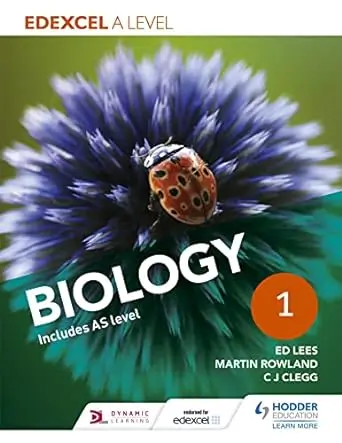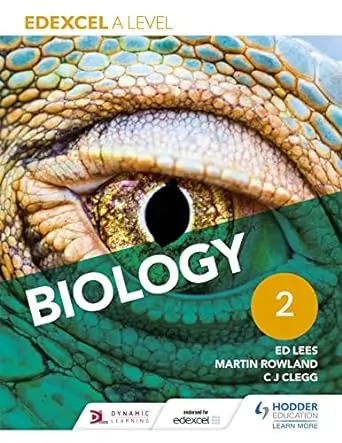The UK is now experiencing increasingly unpredictable weather, with summers extending into September and beyond.
Studying Biology
Discover the science underlying life itself in our Biology A level course. You’ll learn about everything from microbiology and genetics to ecosystems and classification. Whether you’re considering a career in medicine, horticulture, sports science or conservation, Biology is essential for understanding living creatures and the world they inhabit.
Biology A level
£14.99 / month and a £9.99 sign-up fee
How does a course work?
Step 1 – Subscribe to our online course materials
Subscribe to the courses you wish to study. Each course contains everything you require to succeed in your chosen subject, including detailed coverage of all required topics, activities, self-assessment questions and assignments with comprehensive suggested answers. You may choose to have the assignments marked by one of our fully-qualified tutors.
The minimum subscription period is 6 months. After that, you can cancel your subscription at any time. If you wish, you may optionally purchase a printed, spiral-bound course pack at the point of subscription.
Step 2 – Taking control of your studies
You will be allocated a tutor from our bank of PGCE-qualified tutors. Your tutor will arrange a free 15-minute induction call with you to introduce themselves and the course to you. As you require further tutor support, you can purchase:
- Tutorial time, one-to-one in our virtual classroom
- Assignment marking
- Mock Exam marking
Course Outline
Our Biology course can be studied as either an AS level or as a full A level qualification. It provides the basis for a well-rounded understanding of modern biological science, from the micro to the macro-level.
The AS level course covers the fundamental aspects of biology, including cells, viruses and reproduction; biological molecules, classification and biodiversity, and exchange and transport.
If you study for the full A level, you’ll also learn about microbiology and pathogens, genetics, ecosystems, energy for biological processes, origins of genetic variation and control systems.
Together, these modules will help you to develop a knowledge of how biological processes work, deepening your understanding of topics like medicine and disease, evolution and natural selection, habitats and the environment.
The course includes 41 Lessons 14 Tutor-marked assignments and 5 practice exam papers.
Module 1: Molecules, Cells and Reproduction
- Carbohydrates, Lipids, Proteins and Ions
- Two Types of Cell
- Microscopy
- DNA, Protein Synthesis
- Mutations and Viruses
- Enzymes
- Cell Division, Sexual Reproduction
Module 2: Exchange, Transport and Diversity
- Surface Area, Volume and Exchange
- Osmosis
- Gas Exchange
- Circulation, Blood and Transport, Blood and Defence
- Plant Transport
- Classification
- Natural Selection, Biodiversity
Module 3: Energy, Pathogens and DNA
- Aerobic respiration, anaerobic respiration
- Photosynthesis
- Pathogens, antibiotics and endemic diseases
- Response to infection
- Microbial techniques
- Gene expression and stem cells, gene sequencing and gene technology
Module 4: Genetics, Control and Ecosystems
- Mendelian genetics, population genetics
- Homeostasis and hormones
- Nervous systems
- Sight, synapses and control of heart rate
- Osmoregulation and temperature control
- Analysing ecosystems
- Changing ecosystems
Examinations
The A level course is assessed by three written examinations:
- Advanced Biochemistry, Microbiology and Genetics (1 hour 45 minutes, 30% of final mark)
- Advanced Physiology, Evolution and Ecology (1 hour 45 minutes, 30% of final mark)
- General and Practical Principles in Biology (2 hours 30 minutes, 40% of final mark)
Please note that this A level specification lists a number of practical skills to be internally assessed by teachers. The practical endorsement is recorded as a separate entity on your certificate and it does not contribute to your final grade. See the section on the Practical Endorsement for more details.
Course duration and study time
The Recommended number of study hours for this course is 200 hours. You will need to fit all of this in.
Because of the unique way Oxford Home Schooling courses are structured your support will last for as long as you are subscribed to the course, regardless of whether you decide to do the course in 12 months or 18.
Frequently Asked Questions
Why should I choose Oxford Home Schooling?
- Oxford Home Schooling is a long-established educational company that prides itself on
- treating every student as an individual
- excellent customer service
- comprehensive, quality courses.
- We’re rated ‘Excellent’ on Trustpilot by students who have studied with us.
- We provide online and printed resources so you can study your way – other providers do not give you that choice.
- We make it easy for you to home-educate your children with our flexible schedule, tutor support, and subscribtion based payment plan.
- Every year we help hundreds of children who have left mainstream education obtain the qualifications they need to progress and achieve their goals.
Can I complete the exam in one year?
Our cut-off for enrolling on an A level course for the following summer examination series is mid-October each year. So yes you can. However, remember that you will still need to fit around 700 hours of study time into your schedule before the examination. The earlier you enrol, the less study you must do each week!
I want to go on to University, can Oxford Home Schooling help?
In order to go on to university you will need to make an application via the University Colleges Admissions Service (UCAS). We are able to help and we can provide an academic reference and predicted grades as long as;
- The student has paid for the marking service
- Had a minimum of 3 hours of face to fac
- We have been provided with sufficient notice
There is a fee to pay for this and you must apply within our deadline.
Full details full details can be found in our academic reference policy.
How much time does it take to study an A level?
This does depend on the ability of the student and the grade that you wish to achieve. However, we suggest that as a guide students should allow for 700 hours of study per A level.
Is there an age limit and what prior learning is required?
There isn’t a specific age-limit for an A-level course but we strongly recommend that the pupil is a minimum of 15 when they start A-level study and that they are academically capable of starting the course. We strongly recommend prior study to GCSE level and that a student has achieved Grade 6 or above in Biology (I)GCSE and, perhaps, other Science GCSEs and Maths. But our tutors will support students from a wide variety of different backgrounds and adapt to differing levels of prior learning.
When can I enrol?
You can enrol and start any time you like, the earlier the better. The important thing to think about is when you wish to sit your exam and to give yourself plenty of time to work through your materials and revise successfully. Our cut-off dates for enrolment can be found here.
Once you have enrolled, you will get access to your course online immediately and your printed course materials will arrive a few days later.
How and when do I book an exam?
The final date for booking summer exams with the exam board without incurring late entry fees is the 21st of February. You should book your place at an exam centre well in advance of this date. Start looking once the autumn term begins. If you have a SEN need which need to be accommodated start looking a year in advance. Most centres have limited space or facilities. for example if the student requires a reader and/or a scribe, then typically they will also need their own room. Most centre are limited by this and will book on a first come first served basis.
All the information you need to book an exam centre can be found in our Exams Hub. Here you will find
- detailed instructions
- entry codes needed to book exams
- our map of examination centres where our students have taken exams in recent years.
Tutors & Exams offers discounts to Oxford Home Schooling students and has ten current exam venues across the UK: Birmingham, Bolton, Coventry, Doncaster, High Wycombe, Romford, St Neots, Taunton and Wimbledon.
Pearson Edexcel also publishes a list of exam centres that accept private candidates. This won’t list every available centre, so if there’s nothing shown in your area, we recommend contacting local schools and colleges directly.
When will I sit my exam?
The Biology IGCSE papers are available in both the Summer or the Autumn examination series. The Summer series typically runs from mid-May to late June and the Autumn series is in November.
How much does an A-level examination cost?
Your exam fees aren’t included in the course cost as they’re paid directly to the exam centre. They will vary depending on which centre you choose. Generally speaking, dedicated examination services will be more expensive than a local school or college. Prices range from £150 to £350 pounds.
Why do some A level courses have accompanying textbooks?
Most of Oxford Home Schooling’s A Level courses have a recommended accompanying textbook which students will need to obtain.
A level Study is designed to prepare students for the much more independent style of learning that they will encounter at university and degree level. Students will need to read widely around their subject in order to get top marks. As a result, our A level courses have both supporting texts and a recommended reading list to help you achieve a broader understanding of your subject.
By clicking on any of the book images on this website, you will be taken to the relevant page on Amazon’s website. Some courses also include access to online resources. Where this is the case, students will need to have internet access.
From the Blog
Could Apes Really Rule A World Without Us?
Ardent zoologists writing on the BBC’s Science Focus portal argue that humans are not the dominant species and never have been.
DNA: The Blueprint Of Life
We can think of DNA as a large book containing all of our genetic information.







